 The Jewish Theological Seminary (JTS), Yeshiva University and Hebrew Union College-Jewish Institute of Religion (HUC-JIR) recently completed a six-year, $45 million initiative funded by the Jim Joseph Foundation that increased the number of Jewish educators who earned advanced degrees and credentials from the three schools, provided for new or improved teaching programs, and boosted the number of educators who received jobs or promotions.
The Jewish Theological Seminary (JTS), Yeshiva University and Hebrew Union College-Jewish Institute of Religion (HUC-JIR) recently completed a six-year, $45 million initiative funded by the Jim Joseph Foundation that increased the number of Jewish educators who earned advanced degrees and credentials from the three schools, provided for new or improved teaching programs, and boosted the number of educators who received jobs or promotions.
Under what the foundation called its Education Initiative, the three schools also devised new means of sustaining these programs and identified areas in which they could work together on improving the quality of the programs.
“We believe that the field [of Jewish education] needs nothing less than a crusade to recruit and retain new talent to answer the call to educational leadership, be it in our schools, congregations, camps, youth groups or campuses,” said Miriam Heller Stern, national director of the HUC-JIR School of Education. “No single institution can shift the tide alone. The Jim Joseph Foundation has been a key partner and catalyst for change, committing essential financial and professional resources to the task of deepening the impact of our emerging leaders.”
The Jewish Theological Seminary (JTS), Yeshiva University and Hebrew Union College-Jewish Institute of Religion (HUC-JIR) recently completed a six-year, $45 million initiative funded by the Jim Joseph Foundation that increased the number of Jewish educators who earned advanced degrees and credentials from the three schools, provided for new or improved teaching programs, and boosted the number of educators who received jobs or promotions.
Under what the foundation called its Education Initiative, the three schools also devised new means of sustaining these programs and identified areas in which they could work together on improving the quality of the programs.
“We believe that the field [of Jewish education] needs nothing less than a crusade to recruit and retain new talent to answer the call to educational leadership, be it in our schools, congregations, camps, youth groups or campuses,” said Miriam Heller Stern, national director of the HUC-JIR School of Education. “No single institution can shift the tide alone. The Jim Joseph Foundation has been a key partner and catalyst for change, committing essential financial and professional resources to the task of deepening the impact of our emerging leaders.”
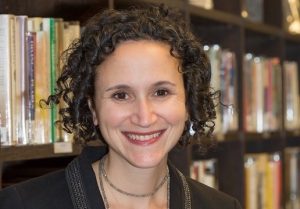
![]() Each of the schools received a grant of $15 million, $1 million of which was set aside for establishing collaboration between the three institutions, to fund its role in the initiative from 2010 to 2016. Along with the funds, the foundation provided the schools with guidance, technical assistance and evaluations of their programs.
Each of the schools received a grant of $15 million, $1 million of which was set aside for establishing collaboration between the three institutions, to fund its role in the initiative from 2010 to 2016. Along with the funds, the foundation provided the schools with guidance, technical assistance and evaluations of their programs.
According to a report prepared for the foundation by the American Institutes for Research (AIR), the grants made it possible for 1,508 people who teach or direct programs in Jewish schools, camps, youth groups, congregations and other settings to receive certificates or master’s degrees in Jewish education. About half of the graduates advanced their careers, and the average return on investment from earning a degree or certificate was a net income gain of $12,000 per year, the AIR report said.
Educators who participated in the initiative’s programs reported that they learned essential skills to succeed in their positions and gained knowledge about Judaism, professional networking, how to be innovative in the classroom and how to lead.
On the institutional side, JTS, HUC-JIR and Yeshiva University improved their strategies for attracting students and raising money to cover the costs of continuing the new programs, and the schools came up with structures for developing and offering online courses, the report said.
“The initiative provided an opportunity for educators to seek training as a way of upward mobility,” said Dawne Bear Novicoff, assistant director of the foundation. “They are staying in Jewish education beyond what had typically been a shorter career.”
The Education Initiative led to 20 new programs, four of which were unprecedented collaboration among the three schools:
• The eLearning Collaborative: Provided seminars and mini grants that promoted the use of educational technology and improved teaching practices in the classroom and online.
• Experiential Jewish Education Conceptual Work: Agreed to practices, processes and structures to improve experiential Jewish education, and studied one another’s work and met at conferences to further their understanding of the topic.
• The Experiential Jewish Education Network: Jointly planned and launched a network that offers continued education as well as platforms for knowledge sharing for alumni of the Education Initiative’s programs.
• The Jewish Early Childhood Education Leadership Institute: In collaboration with Bank Street College, JTS and HUC-JIR created a professional development program for new and aspiring directors of early childhood education centers.
“One of the things we helped provide was a deep partnership component,” Novicoff said. “Several times a year, we brought the institutions together. We gave them a broader view of where they fit in overall. They developed professional relationships, learned from one another and built up each other’s successes.”
At HUC-JIR, Stern said the school was able to recruit working professionals who otherwise might not have pursued graduate studies. It also launched a certificate program in Jewish education that provided training for youth professionals and experiential educators in youth populations. The graduates also were given access to a career services program, in which they could learn how to deal with issues in their new positions.
“The recently released evaluation report confirmed the long-held belief of academic program directors and faculty that a master’s degree in education is truly beneficial for advancing to a leadership position in the field and successfully navigating the challenges of those jobs,” Stern said.
Going forward, the schools are expected to raise their own money for the programs, according to Chip Edelsberg, who was executive director of the foundation during the Education Initiative grant period. “By signing a memorandum, they understood that we were going to judge the success of the grant at each institution,” he said. “So far, they’ve been pretty successful.”
Overall, the grants enabled the three schools to do something they hadn’t been able to achieve before: Come together to work at improving Jewish education.
“The Jim Joseph Education Initiative paved the way for creative collaboration across seminaries, lowering denominational boundaries and building partnerships among leading experts in Jewish education,” Stern said. “We bridged geographic and ideological dispersion. The Jim Joseph grant connected our mission with that of our sister institutions to elevate Jewish education as a whole.”
The Jewish Theological Seminary (JTS), Yeshiva University and Hebrew Union College-Jewish Institute of Religion (HUC-JIR) recently completed a six-year, $45 million initiative funded by the Jim Joseph Foundation that increased the number of Jewish educators who earned advanced degrees and credentials from the three schools, provided for new or improved teaching programs, and boosted the number of educators who received jobs or promotions.
Under what the foundation called its Education Initiative, the three schools also devised new means of sustaining these programs and identified areas in which they could work together on improving the quality of the programs.
“We believe that the field [of Jewish education] needs nothing less than a crusade to recruit and retain new talent to answer the call to educational leadership, be it in our schools, congregations, camps, youth groups or campuses,” said Miriam Heller Stern, national director of the HUC-JIR School of Education. “No single institution can shift the tide alone. The Jim Joseph Foundation has been a key partner and catalyst for change, committing essential financial and professional resources to the task of deepening the impact of our emerging leaders.”
Each of the schools received a grant of $15 million, $1 million of which was set aside for establishing collaboration between the three institutions, to fund its role in the initiative from 2010 to 2016. Along with the funds, the foundation provided the schools with guidance, technical assistance and evaluations of their programs.
According to a report prepared for the foundation by the American Institutes for Research (AIR), the grants made it possible for 1,508 people who teach or direct programs in Jewish schools, camps, youth groups, congregations and other settings to receive certificates or master’s degrees in Jewish education. About half of the graduates advanced their careers, and the average return on investment from earning a degree or certificate was a net income gain of $12,000 per year, the AIR report said.
Educators who participated in the initiative’s programs reported that they learned essential skills to succeed in their positions and gained knowledge about Judaism, professional networking, how to be innovative in the classroom and how to lead.
On the institutional side, JTS, HUC-JIR and Yeshiva University improved their strategies for attracting students and raising money to cover the costs of continuing the new programs, and the schools came up with structures for developing and offering online courses, the report said.
“The initiative provided an opportunity for educators to seek training as a way of upward mobility,” said Dawne Bear Novicoff, assistant director of the foundation. “They are staying in Jewish education beyond what had typically been a shorter career.”
The Education Initiative also led to unprecedented collaboration among the three schools, which participated in four new programs:
• The eLearning Collaborative: Provided seminars and mini grants that promoted the use of educational technology and improved teaching practices in the classroom and online.
• Experiential Jewish Education Conceptual Work: Agreed to practices, processes and structures to improve experiential Jewish education, and studied one another’s work and met at conferences to further their understanding of the topic.
• The Experiential Jewish Education Network: Jointly planned and launched a network that offers continued education as well as platforms for knowledge sharing for alumni of the Education Initiative’s programs.
• The Jewish Early Childhood Education Leadership Institute: In collaboration with Bank Street College, JTS and HUC-JIR created a professional development program for new and aspiring directors of early childhood education centers.
“One of the things we helped provide was a deep partnership component,” Novicoff said. “Several times a year, we brought the institutions together. We gave them a broader view of where they fit in overall. They developed professional relationships, learned from one another and built up each other’s successes.”
At HUC-JIR, Stern said the school was able to recruit working professionals who otherwise might not have pursued graduate studies. It also launched a certificate program in Jewish education that provided training for youth professionals and experiential educators in youth populations. The graduates also were given access to a career services program, in which they could learn how to deal with issues in their new positions.
“The recently released evaluation report confirmed the long-held belief of academic program directors and faculty that a master’s degree in education is truly beneficial for advancing to a leadership position in the field and successfully navigating the challenges of those jobs,” Stern said.
Going forward, the schools are expected to raise their own money for the programs, according to Chip Edelsberg, who was executive director of the foundation during the Education Initiative grant period. “By signing a memorandum, they understood that we were going to judge the success of the grant at each institution,” he said. “So far, they’ve been pretty successful.”
Overall, the grants enabled the three schools to do something they hadn’t been able to achieve before: Come together to work at improving Jewish education.
“The Jim Joseph Education Initiative paved the way for creative collaboration across seminaries, lowering denominational boundaries and building partnerships among leading experts in Jewish education,” Stern said. “We bridged geographic and ideological dispersion. The Jim Joseph grant connected our mission with that of our sister institutions to elevate Jewish education as a whole.”
![]() Each of the schools received a grant of $15 million, $1 million of which was set aside for establishing collaboration between the three institutions, to fund its role in the initiative from 2010 to 2016. Along with the funds, the foundation provided the schools with guidance, technical assistance and evaluations of their programs.
Each of the schools received a grant of $15 million, $1 million of which was set aside for establishing collaboration between the three institutions, to fund its role in the initiative from 2010 to 2016. Along with the funds, the foundation provided the schools with guidance, technical assistance and evaluations of their programs.
According to a report prepared for the foundation by the American Institutes for Research (AIR), the grants made it possible for 1,508 people who teach or direct programs in Jewish schools, camps, youth groups, congregations and other settings to receive certificates or master’s degrees in Jewish education. About half of the graduates advanced their careers, and the average return on investment from earning a degree or certificate was a net income gain of $12,000 per year, the AIR report said.
Educators who participated in the initiative’s programs reported that they learned essential skills to succeed in their positions and gained knowledge about Judaism, professional networking, how to be innovative in the classroom and how to lead.
On the institutional side, JTS, HUC-JIR and Yeshiva University improved their strategies for attracting students and raising money to cover the costs of continuing the new programs, and the schools came up with structures for developing and offering online courses, the report said.
“The initiative provided an opportunity for educators to seek training as a way of upward mobility,” said Dawne Bear Novicoff, assistant director of the foundation. “They are staying in Jewish education beyond what had typically been a shorter career.”
The Education Initiative also led to unprecedented collaboration among the three schools, which participated in four new programs:
• The eLearning Collaborative: Provided seminars and mini grants that promoted the use of educational technology and improved teaching practices in the classroom and online.
• Experiential Jewish Education Conceptual Work: Agreed to practices, processes and structures to improve experiential Jewish education, and studied one another’s work and met at conferences to further their understanding of the topic.
• The Experiential Jewish Education Network: Jointly planned and launched a network that offers continued education as well as platforms for knowledge sharing for alumni of the Education Initiative’s programs.
• The Jewish Early Childhood Education Leadership Institute: In collaboration with Bank Street College, JTS and HUC-JIR created a professional development program for new and aspiring directors of early childhood education centers.
“One of the things we helped provide was a deep partnership component,” Novicoff said. “Several times a year, we brought the institutions together. We gave them a broader view of where they fit in overall. They developed professional relationships, learned from one another and built up each other’s successes.”
At HUC-JIR, Stern said the school was able to recruit working professionals who otherwise might not have pursued graduate studies. It also launched a certificate program in Jewish education that provided training for youth professionals and experiential educators in youth populations. The graduates also were given access to a career services program, in which they could learn how to deal with issues in their new positions.
“The recently released evaluation report confirmed the long-held belief of academic program directors and faculty that a master’s degree in education is truly beneficial for advancing to a leadership position in the field and successfully navigating the challenges of those jobs,” Stern said.
Going forward, the schools are expected to raise their own money for the programs, according to Chip Edelsberg, who was executive director of the foundation during the Education Initiative grant period. “By signing a memorandum, they understood that we were going to judge the success of the grant at each institution,” he said. “So far, they’ve been pretty successful.”
Overall, the grants enabled the three schools to do something they hadn’t been able to achieve before: Come together to work at improving Jewish education.
“The Jim Joseph Education Initiative paved the way for creative collaboration across seminaries, lowering denominational boundaries and building partnerships among leading experts in Jewish education,” Stern said. “We bridged geographic and ideological dispersion. The Jim Joseph grant connected our mission with that of our sister institutions to elevate Jewish education as a whole.”
Source: “Foundation grants spur training of Jewish educators,” Jewish Journal, November 4, 2016
 Jewish students across the country mobilized to create affordable solutions to improve lives.
Jewish students across the country mobilized to create affordable solutions to improve lives.

 [This article is the third in a
[This article is the third in a 
 The Foundation for Jewish Camp has added URJ 6 Points Sci-Tech Academy West to its Specialty Camp Incubator III cohort.
The Foundation for Jewish Camp has added URJ 6 Points Sci-Tech Academy West to its Specialty Camp Incubator III cohort.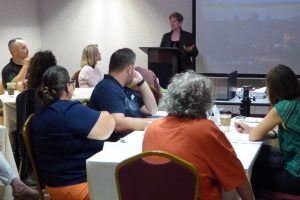
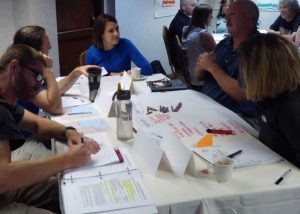
 The Jewish Theological Seminary (JTS), Yeshiva University and Hebrew Union College-Jewish Institute of Religion (HUC-JIR) recently completed a six-year, $45 million initiative funded by the Jim Joseph Foundation that increased the number of Jewish educators who earned advanced degrees and credentials from the three schools, provided for new or improved teaching programs, and boosted the number of educators who received jobs or promotions.
The Jewish Theological Seminary (JTS), Yeshiva University and Hebrew Union College-Jewish Institute of Religion (HUC-JIR) recently completed a six-year, $45 million initiative funded by the Jim Joseph Foundation that increased the number of Jewish educators who earned advanced degrees and credentials from the three schools, provided for new or improved teaching programs, and boosted the number of educators who received jobs or promotions.
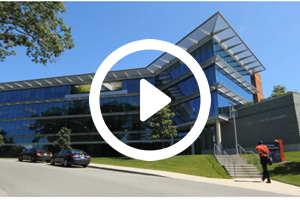
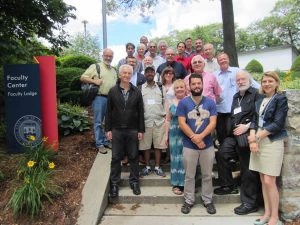
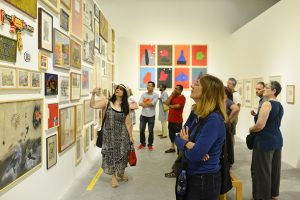
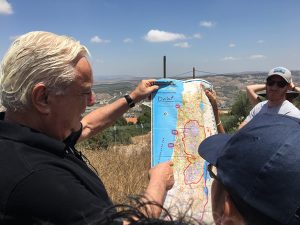
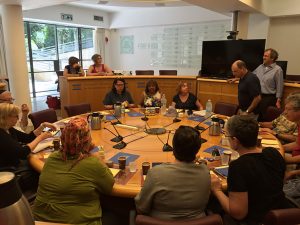
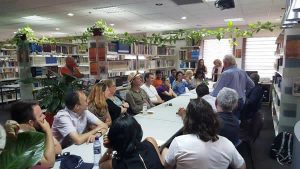
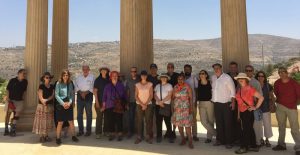
 The Louisville Jewish Community Center has had a garden for years, but never the staff to make the most of it. For Michael Fraade, a member of the first cohort of Hazon’s JOFEE Fellowship who is spending the year working on the JCC’s environmental programming, that garden has the potential to change the ways in which members of the community understand the rich relationship between the earth and Judaism.
The Louisville Jewish Community Center has had a garden for years, but never the staff to make the most of it. For Michael Fraade, a member of the first cohort of Hazon’s JOFEE Fellowship who is spending the year working on the JCC’s environmental programming, that garden has the potential to change the ways in which members of the community understand the rich relationship between the earth and Judaism.